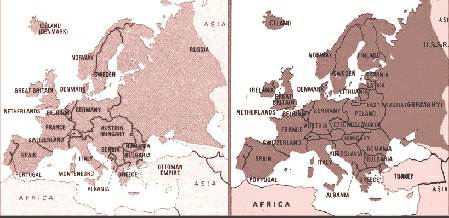|
PinkMonkey Online Study Guide-World History
11.4 Consequences of World War I
Revolutionary changes were brought about
by World War I in all forms of social life, as well as in
all modes of thinking. The war produced consequences of worldwide
significance. World War I caused a terrible loss of human life
and property. It involved practically all the countries of Europe
and the U.S.A., as well as most of the African and Asian states.
Nine million men were killed, and twenty-nine million men were wounded
or missing. Thirteen million died on account of civilian massacres,
disease and famine, which overtook the world, as a consequence of
the Great War. The financial cost of the Great War was estimated
to have been about 400 billion dollars.
The map of Europe was reconstructed by a series of treaties.

Exhibit 11.4
Europe before and after the first World War
Click here to enlarge
By the Treaty of Versailles, Germany surrendered
-
The provinces of Alsace and Lorraine and the
coal mines of the Saar basin to France
-
Eupen and Malmedy to Belgium
-
Memel to Lithuania
-
Northern Schleswig to Denmark
-
Five-sixth of the territory of Posen, most
of West Prussia and Upper Silesia and Danzig (the corridor to
the sea) to Poland.
The Treaty of St. Germain was imposed on Austria on September 10, 1919. As a result of this treaty, the Empire of Austria-Hungary was destroyed. Austria and Hungary were separated. Yugoslavia and Czechoslovakia were created as two new states.
The Allies imposed a separate treaty, called the Treaty of Trianon, upon Hungary on June 4, 1920. Hungary lost about 90,000 square miles of territory with a population of about 12 million under this treaty.
The Treaty of Nevilly was forced by the Allies upon Bulgaria on November 27, 1919.
Finally, the Allied powers imposed the Treaty of Sevres upon Turkey on August 10, 1920.
Nationalism triumphed to a great extent.
The German, the Austrian and Hungarian, the Turkish and the Russian
empires were shattered. On their ruins, new national states were
built, which were founded on the principle of ‘self-determination’
of the people, as advocated by President Woodrow Wilson. The Polish
territories, which were seized by Russia, Prussia and Austria, at
the congress of Vienna of 1815, were joined to form the sovereign
state of Poland. Yugoslavia and Czechoslovakia were formed into
two new independent ideologies and economic systems.
The above Treaties aimed at reducing the armaments of the vanquished and keeping them militarily weak. The Treaty of Versailles made Germany stand fully unarmed before the fully armed Allied powers. All kinds of tanks, armored cars, military aeroplanes, submarines and airforce, were forbidden in Germany. The manufacture of arms and ammunition was heavily restricted. The Treaty of St. Germain reduced the Austrian army to 30,000 soldiers and her naval force to only three police boats on the Danube.
The end of the war caused serious problems such as large-scale unemployment and also a disruption of normal industrial and economic life. This created a favorable atmosphere for the growth of leftist and other parties, such as Socialist, Communist, Fascist and Nazi parties which gained power in Europe. It also led to the birth of communism in Russia, and authoritarian dictatorships in Italy, Germany, Spain and Turkey.
The Allied Powers set up a Reparation Commission to estimate the total amount of reparation to be made by Germany. The latter was supposed to make financial atonement for all damage done to the civilian population of the Allies. It was to make an initial payment of five billion dollars. It was also to devote its economic resources to the physical restoration of the devastated areas in France. German criminals were to be tried and punished by military tribunals of the Allied Powers.
World War I led to the emergence of Great Powers in Europe, America and the Far East. Great Britain proved to be the leading maritime and colonial power on earth. France came to be regarded as a great military power in Europe. Japan enhanced its power and prestige in the Far East, at the cost of China and Russia. Finally, the U.S.A. emerged from the Great War as a great world power.
The Treaty of Versailles was too harsh on Germany; it was fully deprived of her colonies and was totally disarmed by the treaty. She had to pay a crushing war indemnity.
It was natural then, that the Germans grew up on the cult of revenge under the leadership of Adolph Hitler who was mainly responsible for World War II.
To promote international co-operation and peace, the American President Woodrow Wilson decided to create the League of Nations at the Paris Peace Conference. It was to function through three organs namely, an Assembly, a Council and a Permanent Secretariat. It was to have two affiliated organizations called the Permanent Court of International Justice and the International Labor Office.
[next page]
|